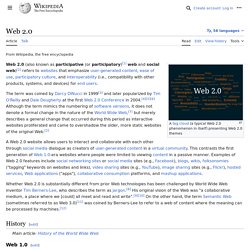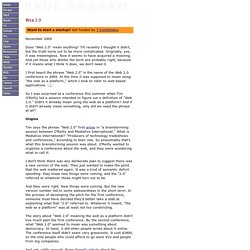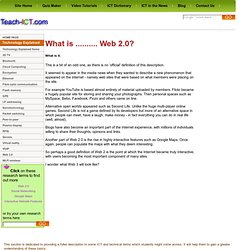

Web 2.0. World Wide Web sites that use technology beyond the static pages of earlier Web sites A tag cloud (a typical Web 2.0 phenomenon in itself) presenting Web 2.0 themes Web 2.0 (also known as participative (or participatory)[1] web and social web)[2] refers to websites that emphasize user-generated content, ease of use, participatory culture and interoperability (i.e., compatible with other products, systems, and devices) for end users.

The term was coined by Darcy DiNucci in 1999[3] and later popularized by Tim O'Reilly and Dale Dougherty at the first O'Reilly Media Web 2.0 Conference in late 2004.[4][5][6] Although the term mimics the numbering of software versions, it does not denote a formal change in the nature of the World Wide Web, but merely describes a general change that occurred during this period as interactive websites proliferated and came to overshadow the older, more static websites of the original Web.[7] History[edit] Web 1.0[edit] Characteristics[edit] What Is Web 2.0.
By Tim O'Reilly 09/30/2005 Oct. 2009: Tim O'Reilly and John Battelle answer the question of "What's next for Web 2.0? " Web 2.0. November 2005 Does "Web 2.0" mean anything?

Till recently I thought it didn't, but the truth turns out to be more complicated. Originally, yes, it was meaningless. Now it seems to have acquired a meaning. And yet those who dislike the term are probably right, because if it means what I think it does, we don't need it. I first heard the phrase "Web 2.0" in the name of the Web 2.0 conference in 2004. So I was surprised at a conference this summer when Tim O'Reilly led a session intended to figure out a definition of "Web 2.0. " Origins Tim says the phrase "Web 2.0" first arose in "a brainstorming session between O'Reilly and Medialive International. " I don't think there was any deliberate plan to suggest there was a new version of the web.
And they were right. The story about "Web 2.0" meaning the web as a platform didn't live much past the first conference. And yet, oddly enough, Ryan Singel's article about the conference in Wired News spoke of "throngs of geeks. " Well, no. What is Web 2.0? Teach ICT What is web 2.0? What is it.

This is a bit of an odd one, as there is no 'official' definition of this description. It seemed to appear in the media news when they wanted to describe a new phenomenon that appeared on the internet - namely web sites that were based on what members were placing on the site. For example YouTube is based almost entirely of material uploaded by members. Flickr became a hugely popular site for storing and sharing your photographs. Then personal spaces such as MySpace, Bebo, Facebook, Piczo and others came on line. Alternative open worlds appeared such as Second Life. Blogs have also become an important part of the Internet experience, with millions of individuals willing to share their thoughts, opinions and links. Another part of Web 2.0 is the rise in highly interactive features such as Google Maps. So perhaps a good definition of Web 2 is the point at which the Internet became truly interactive, with users becoming the most important component of many sites.